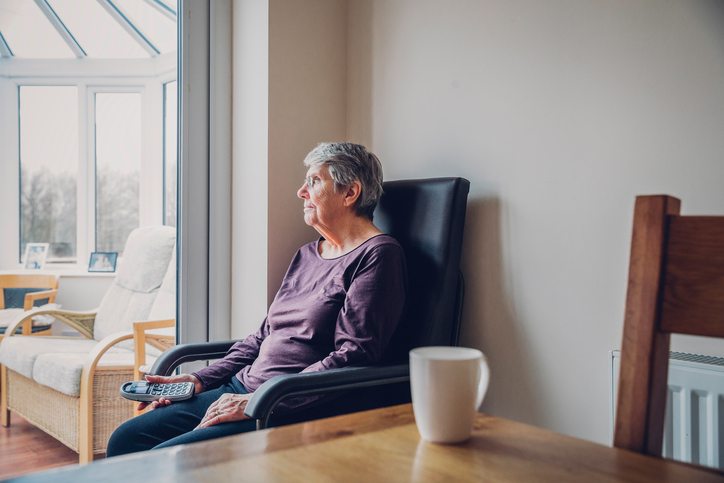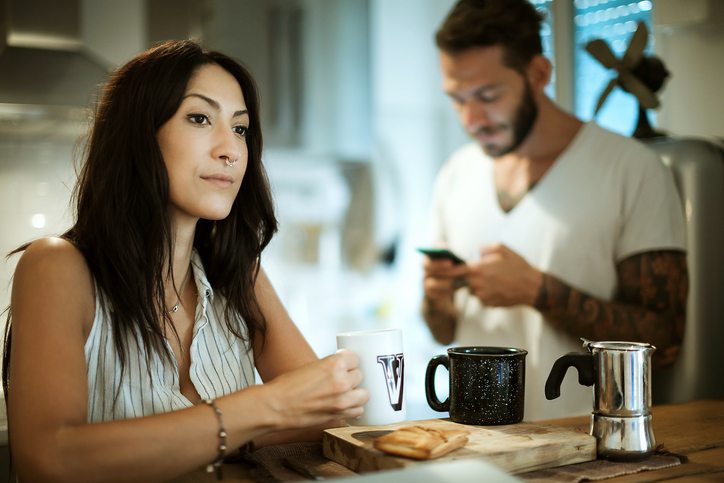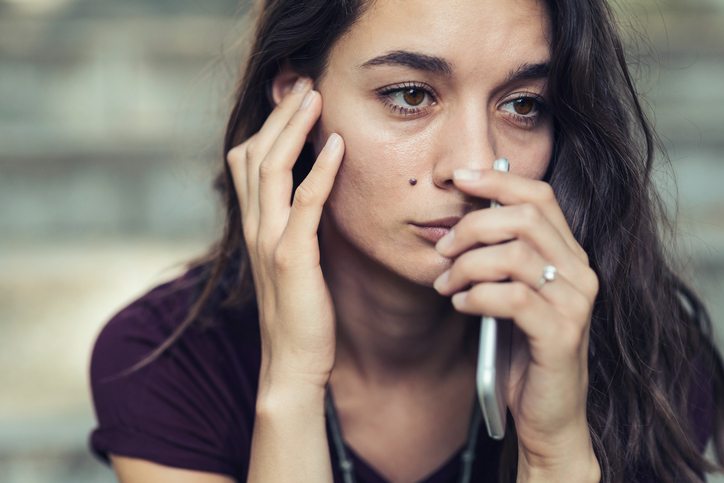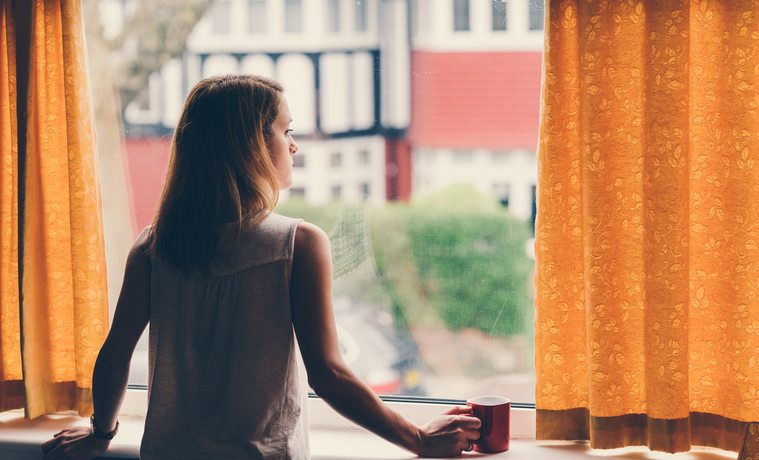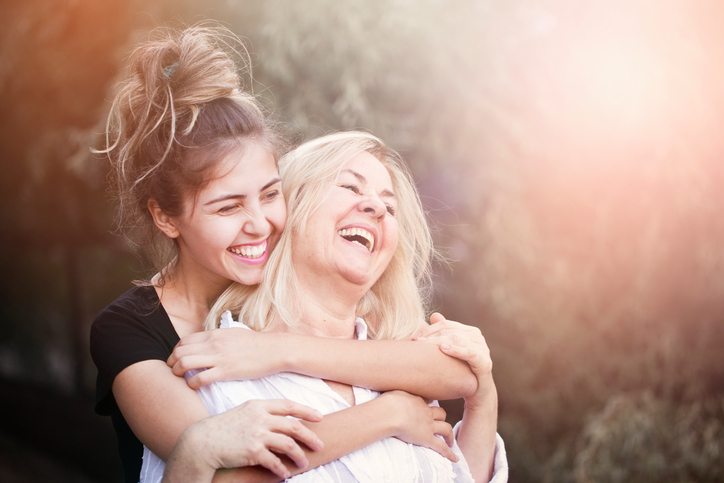Annie Siddons, a mother and writer whose loneliness brought her to the brink of suicide, shares 13 myths that surround the silent epidemic
Today the Office for National Statistics (ONS) has released new figures showing that five per cent of adults in England say they ‘often’ or ‘always’ feel lonely. Findings from the Community Life Survey (CLS) 2016-2017 show that women are more likely to feel lonely than men and those who are single or in poor health are at a particular risk of feeling lonely more often.
In a bid to continue to work of the late MP Jo Cox, the government announced that they have appointed a minister for loneliness. Tracey Crouch says she’s proud to take on this ‘generational challenge.’ On December 15th last year, the Jo Cox Commission, set up by the late MP before her murder in June 2016, highlighted the damaging effects of loneliness on people’s health. It challenged the government to step forward and address what has been labelled as a ‘social epidemic’ and ‘urgent crisis’.
Annie Siddons is one of the nine million adults affected by loneliness. But she isn’t a stereotypical old widow in an empty house, friendless or bored, as the stereotype goes. ‘I want to apologise to anyone who was on a train with me from about 2013-2015’, says Annie Siddons, 45. ‘I did a lot of very unattractive, very drunk weeping on public transport’. During a period of chronic loneliness which made her suicidal, Annie was a single mother to two daughters living in the suburbs of London. ‘I lost my sh*t, completely’, she says. ‘It got to the point where I couldn’t see a way out of it. I was feeling that way acutely for about two years but I think it had been building up before that. I’m a tough person but I just couldn’t fight it. I think compounded to that was my sense of shame. I was so embarrassed and I didn’t want to present myself like that.’ It took this hitting rock bottom for Annie to start talking about what is become a silent epidemic in Britain.
According to Campaign to end Loneliness, more than half of British adults (56 per cent) say admitting to loneliness is difficult, but left ignored, it can have serious long term health implications. It is as bad for you as having diabetes, high blood pressure or smoking 15 cigarettes a day, and is deadlier than obesity – shockingly, it can increase the risk of an early death (before the age of 70) by up to 50 per cent, in comparison to obesity raising the risk by 30 per cent.
This is according the biggest review into the issue to date, looking at 218 studies. The US researchers concluded loneliness has become a major public health hazard and GPs in the UK are agreeing. Already three out of four GPs say they are seeing up to five lonely people a day, according to research undertaken in 2013 by Campaign to End Loneliness, but 13 per cent don’t feel well-equipped to help them. ‘The guidelines say we should be talking to them about their weight, exercise and prescribing more medication – but really what these patients need is someone to listen to them and to find purpose in life’, says Professor Helen Stokes-Lampard, Chair of the Royal College of GPs, who recently highlighted the importance of GPs making more time to see lonely patients.
What does loneliness really feel like?
‘I describe my loneliness as a walrus’, says Annie. ‘He felt aggressive, rude, hostile, mischievous, heavy, smelly, a burden. I was carrying his presence with me all the time and I felt like others could sense him.
‘Everything, including every day tasks, became very difficult. It felt like I was wrestling the walrus just to get out of bed, make breakfast, take the kids to school, do my work and appear to be competent’, says Annie. Newly split from her husband, Annie lived in Twickenham with her two daughters, one of whom was very sick. She put on a brave face – as any parent would – hustling for work as a self-employed writer in the arts with financial strain. ‘Writing is a very solitary profession and when it’s just you, your laptop and your brain, and your brain is dominated by the walrus, it’s not easy to get the job done. I went through months and months of just weeping at my computer. It wasn’t like I could talk to people in an office – sometimes you just need people to chat rubbish with, about Game of Thrones or your commute. If you don’t have that, it’s just you, alone’, she recalls.

The best definition Annie came across for loneliness was from John Cacioppo, author of Loneliness: Human Nature and the Need for Social Connection. ‘He says loneliness is a gap between your connection needs and the amount of connection that you get. I was craving connection. My children are hilarious and good company, but the relationship I have with them is very different from those you have with adults. I could go days and days without speaking to an adult’, says Annie.
It took a long time for Annie tell herself, ‘I’m not okay’. ‘That was my own ego and pride getting in the way’. Two years later and it’s a different story. Annie has made a show about her experience of loneliness, How Not to Live in Suburbia, touring in Spring 2018, as her way of contributing to the taboo topic. ‘It’s a good, rich time to talk about loneliness. It’s being understood from a more scientific neuro-psychiatric point of view, looking at what happens to the brains of lonely people and how their behaviours are impacted.’
Through her own research and experience, Annie shares with Healthista 13 common myths that surround loneliness, some of which will surprise you.
Myth #1. Loneliness is just an emotion
Listening to Annie’s story may seem dramatic, she admits so herself. ‘At first I gawped at being so grand about it but then I read the science and I felt validated’, she says. ‘We now know about emotional pain having similar effects on the body to physical pain. Physically, I was in a lot of pain too. It feels like you are deprived like hunger and as though your survival is at stake.
‘Your heart beats faster, your adrenal glands work harder and your cortisol levels go up. Your whole body is constantly in crisis and stress mode and we know now that can knock years off your life. What’s more, people who are lonely might develop drug or drink habits which can also impact their long term health outcomes’.
Myth #2. Only old people get lonely
Heart-wrenching statistics from Age UK in 2014 found that two fifths all older people (about 3.9 million) say the television is their main company. It’s a fate that terrifies us all – 9 in 10 people believe loneliness in older age is now more likely than ever, according to Campaign to end Loneliness. But Annie says such research about the elderly dominating the media is a problem. ‘It’s as if only old people are allowed to be lonely and for the rest of us its super cringe and shameful’, she says.
Some research poses that it’s young people suffering the most, such as a Nationwide Building Society survey of 2,000 people. It found that almost 90 per cent of people aged between 18 and 34 say they have felt lonely at some point in their lives, compared with 70 per cent of over-55s .
‘A lot of university students say they are lonely’, Annie says. ‘My show represents the life of a single mother in her 40s. But describing what loneliness feels like was something so many people related to. Lot’s of young people, as well as the elderly, said ‘Oh my god, you have described my life’. It’s horrific, in a way, that it touches so many people.’
Myth #3. People are willing to talk about loneliness
You would hope that if you told a friend you were feeling lonely, they would feel empathy. But in Annie’s experience, people would shudder just at the inkling of the conversation. ‘I tried to bring it up casually with friends and it would be shut down, even though my friends are great and some of them have had mental health issues.
People want to get out of the loneliness conversation ASAP
‘When you say ‘I’m feeling depressed’, people say ‘That’s terrible, I’m sorry to hear that’. They wouldn’t say callous things such as ‘go for a run’ or ‘make fairy cakes’. With loneliness, people just want to get out of that conversation ASAP. Not because it’s not real, but because it is real. It is too raw for some people. In the media, it’s okay to be lonely if you are a frail old person, widowed and isolated. That is the face of loneliness, and as a society we are able to box that up and say ‘well that’s not me’.’
Myth #4. People who are lonely are unsociable
It’s easy to assume that those who are lonely want to be or that it’s their own fault. ‘If there is one thing I want people to understand it’s that there is no correlation between low social skills and loneliness’, says Annie. ‘I discovered that, up until recently, an approach for helping lonely people was to send them on social skills training, which is offensive. It rubs salt into wounds. I think that’s the reason people don’t want to talk about it. People are afraid of being seen as bad at making friends’.
Even Annie was surprised when she ‘came out’ as lonely. ‘I have a lot of friends, I love a lot of people and I’m very sociable. I have all the protections against loneliness. But I was socially isolated, living miles away from close friends and spending hours of the day working alone. My child was ill and I was single, all these things cut me off from people.’
Myth #5. People who have lots of friends and a good marriage can’t be lonely
That beaming socialite on Facebook who is always hanging out with plenty of friends couldn’t be lonely, right? Wrong. ‘People need to fess up. No matter how glittery or shiny their life is, it might not be enough for them. We need deep connection with people but that will look different for different people.’
Annie reiterates Cacioppo’s philosophy that loneliness is one’s own perceived social isolation. ‘Someone may be an introvert who enjoys their own company and only needs one or two close friends to be happy. Whereas some people need 20 close friends and several sex partners, they appear to be the life and soul of the party. But they might not be getting their deep connection needs met. It’s very personal, and it requires you to identify how much you need. Then you might realise your life doesn’t allow for you to have that.’
In the same realm, Annie suggests you can be lonely in a happy marriage, too. ‘That one person who you share finances with, raise children with, have a house with and go on holiday with – how is it possible for them to be your everything? I don’t think it is, and realising you need closeness to lots of types of people is normal.’
Myth #6. A short visit to grandma is enough
Older people like a whole story and to look forward to your visit
‘I’ll just pop in to see grandma for half an hour’, you think to yourself as you drive home from work. 17 per cent of older people are in contact with family, friends and neighbours less than once a week and 11 per cent are in contact less than once a month. Even when we do make time for our lonely grandparents, Annie says there is a right and wrong way to do it. ‘It’s great to hold an old person’s hand, connect with them and look them in the eye to make them feel in that moment, they aren’t alone. But what is sad is that old people won’t clear up their family’s mess for ages, because they want to feel other people’s stories and lives in their space, not the pristine sterile home they are in all the time.
‘They like a whole story and to look forward to your visit. They don’t want you to say ‘I’m coming today’ or to just turn up. They want you to say ‘I’m coming in two weeks’. It’s important not to leave abruptly, but gently, and to try and follow it up with a phonecall or photo if you can to extend that communication.’
Myth #6. That person is alone because they are nasty
If you’re chronically lonely it actually changes your perception of the world cognitively
That old bitter neighbour who always screams at your kids for no reason isn’t lonely because he is mean. He is mean because he is lonely, and new science is showing it comes from a physical state of change in the brain. ‘If you’re chronically lonely it actually changes your perception of the world cognitively’, says Annie. ‘You become defensive and protective of yourself. You perceive the world as hostile towards you, so you become hostile towards it. I definitely got sucked into that frame of mind and I still have days where I view every encounter as negative.
‘I’d say there is about a six month window where you feel lonely but you’re able to get out of it before you brain settles into those patterns. You might need someone else to help retrain your brain so you don’t shout at the newsagent or get road rage.
The buzzword of the moment is mindfulness. In terms of loneliness, it means really checking in with yourself and asking, ‘I think my neighbour just dissed me. Are they an arsehole or did they just say good morning in a neutral way?’’
Myth #7. Lonely people are bored with nothing to do
Sometimes loneliness edges upon you on a Friday night when you’re without company, bored and the house is quiet. For Annie, it had been silently growing in the background of her busy life. ‘It took me such a long time to identify my loneliness because I had so many other issues going on. I was stressed, had money problems and was looking after two children. When you’re a parent you’re not necessarily looking at yourself deeply because you are not the most important thing in your life. It took a lot of soul searching for me to admit I was profoundly lonely and I needed to deal with it.’
When Annie would have a spare half hour, craving for a chat with a friend, the business of others’ lives got in the way. ‘It doesn’t matter if you have close friends, it’s all about timing. People don’t have the luxury of a long conversation anymore. The first couple of times it’s okay, life goes on. But when it becomes a major pattern, it is harder to tolerate.’
Myth #8. Social media keeps us connected
It would seem we are more connected than ever with the ease of an instant WhatsApp or 10 second Snapchat to friends. But for most of us, social media is cutting us off from society. Recent research shows that more than two hours of social media a day doubles the chances of a person experiencing social isolation. Can you remember the last time you phoned your best friend, chatting away into the night like teenagers? ‘We know scientifically that a phone conversation is a richer connection than one on social media’, says Annie.
For someone suffering with chronic loneliness our modern way of communicating can have a surprisingly severe impact. ‘One thing I really found difficult when I was lonely was the casualness of rearrangement. I was supposed to be meeting a friend and they cancelled on me 20 minutes beforehand on WhatsApp. It felt like a stab to the heart. They weren’t being malicious and their reasons were very valid. But it is brutal when you are feeling vulnerable and this horrible physical and emotional feeling can last days, even weeks’, Annie says.
Myth #9. That friend is just sleeping around
No matter what her situation, that girlfriend has always got a guy on the go. Have you ever thought it might be part of a deeper issue? ‘When I was lonely I was trying all sorts of ways to get a connection with people. I was being promiscuous, taking lots of risks with my sexual and emotional health’, Annie recalls.
Lonely people probably think they aren’t worth self care
These behaviours, alongside addictions to alcohol and drugs, are being recognised as common amongst lonely people. ‘Anything that gives you a hit that is either so powerful that makes you forget you are lonely or somehow simulates the feeling of a connection,’ says Annie. A vicious cycle can occur whereby lonely people with addictions become more isolated. ‘People who are lonely probably think they aren’t worth self care or can’t be bothered. Some people just become arseholes. If you burn the only bridges you have left, that’s very sad’, says Annie.
Myth #10. You can make friends anywhere you live
London, the capital of the UK, has a vibrant population of over 8.5 million. Despite this, London ranks the top loneliest global city, according to a Time Out survey. Only 7 per cent of Londoners strongly agree the city is a good place to make new friends.
Annie feels this spreads to the sleepy suburbs too. ‘Where I live was a big factor in increasing my loneliness’, says Annie, who lives in Twickenham. ‘I was on the outside, literally and metaphorically. Everyone was in nuclear families and there was a yummy mummy culture, with money and super expensive buggies. They were stressed about their brilliant two year old’s achievements and their weekly triathlon. I’m not mocking that way of life. But I didn’t fit in, no matter how hard I tried.’
Despite around 250 languages being spoken in London, showing our cities huge cultural diversity, Annie believes we live in ‘bubbles’. ‘I don’t think it’s healthy to have mono culture. I struggled in an affluent, middle class, almost exclusively white, heterosexual village of London. It’s equally as hard for someone in a pocket where people are extremely impoverished or mentally unwell, or if you are the only gay person in a heterosexual town. You can live in a tiny flat in the centre of London where no one speaks to each other – I can’t imagine how lonely that is,’ she says.
Myth #11. A coffee with an old friend will help
For some, making small changes could make a huge difference. Mind, the mental health charity, suggests people can join new clubs, online communities or volunteer to open up their connections. ‘It can be relatively easy to solve once people notice they are lonely’, says Annie. ‘But I would be really reluctant to say, ‘It’s fine guys, all you need to do to solve loneliness is call up an old girlfriend’.’
Annie points out that for those with chronic loneliness, the brain’s behaviours and perception of the world are altered in a way that makes you hostile towards others. What’s more, there are a huge number of lonely people who physically can’t shake up their social lives. ‘For those who are disabled, carers, unable to travel or even without internet, these tips aren’t realistic’, says Annie.
Myth #12. We don’t want a hug
Brits’ way of greeting each other doesn’t stretch further than a prude kiss on the cheek. But this is a far stretch from monkeys, who we evolved from. ‘Apes touch each other all the time, playing, stroking and pushing each other’, says Annie, who suggests physical contact for lonely people is essential.
A recent study by University College London supports this, with academics concluding that the power of a gentle hug is so strong it can ease feelings of loneliness and rejection. ‘Hugging is very good’, says Annie. ‘But we have become squeamish about physical touching. Not many of us do in the workplace. And more seriously, we aren’t allowed to touch young, vulnerable or old people. Most of us are benevolent in our intentions, such as a teacher hugging a sad child. But to prevent inappropriate touching, we are also preventing many acts of beneficial touching’, says Annie.
That’s where man’s best friend comes in. ‘There is a lot of talk about how good pets are for lonely people. It’s in the science – stroking a cat lowers the heart rate, blood pressure and cortisol levels.’
Myth #13. You might be lonely, but you’ll survive
Or will you? ‘Food, drink and shelter are essential for our safety. But then connection comes in very closely as a fundamental animal need’, says Annie, who describes her bleakest times felt she was fighting for her life. ‘It’s like a cue similar to thirst or hunger, a warning to your that you need to switch things up.’
What do we do about loneliness?
Despite loneliness not being recognised as a mental health issue, Mind recognises states on it’s website that ‘the two are strongly linked’. Whilst the conversation about mental health issues such as depression and anxiety open up, loneliness slightly lags behind. ‘It’s brilliant that our view on mental health is shifting and congratulations to celebrities such as Prince Harry contributing to that’, says Annie. ‘But amongst the noise, I think people with loneliness worry they won’t be taken seriously, that it will shame them or make them look weird. They need to be courageous and talk.’
Annie largely encourages calling the Samaritans, an anonymous 24/7 helpline, if you are lonely. But as a society, we need to look at it in a much broader sense. The Jo Cox Commission report says that tackling loneliness is a ‘challenge that can only be met by concerted action by everyone. Governments, employers, businesses, civil society organisations, families, communities and individuals all have a role to play.’ Annie agrees; ‘We need to push the conversation to bigger figures especially policy makers and those in power. We can’t avoid talking about politics. Funding cuts to libraries, children and mental health services – these are all things that effect peoples’ quality of life.
‘Hugs, pets, talking and politics is my view on the solution!’

READ MORE
Is insomnia making you lonely?
‘My job’s great but I’m lonely’
‘How I overcame my post natal depression’
How to make friends as an adult – an expert’s guide tested
What it’s REALLY like to live with schizophrenia
Like this article? Sign up to our newsletter to get more articles like this delivered straight to your inbox.




